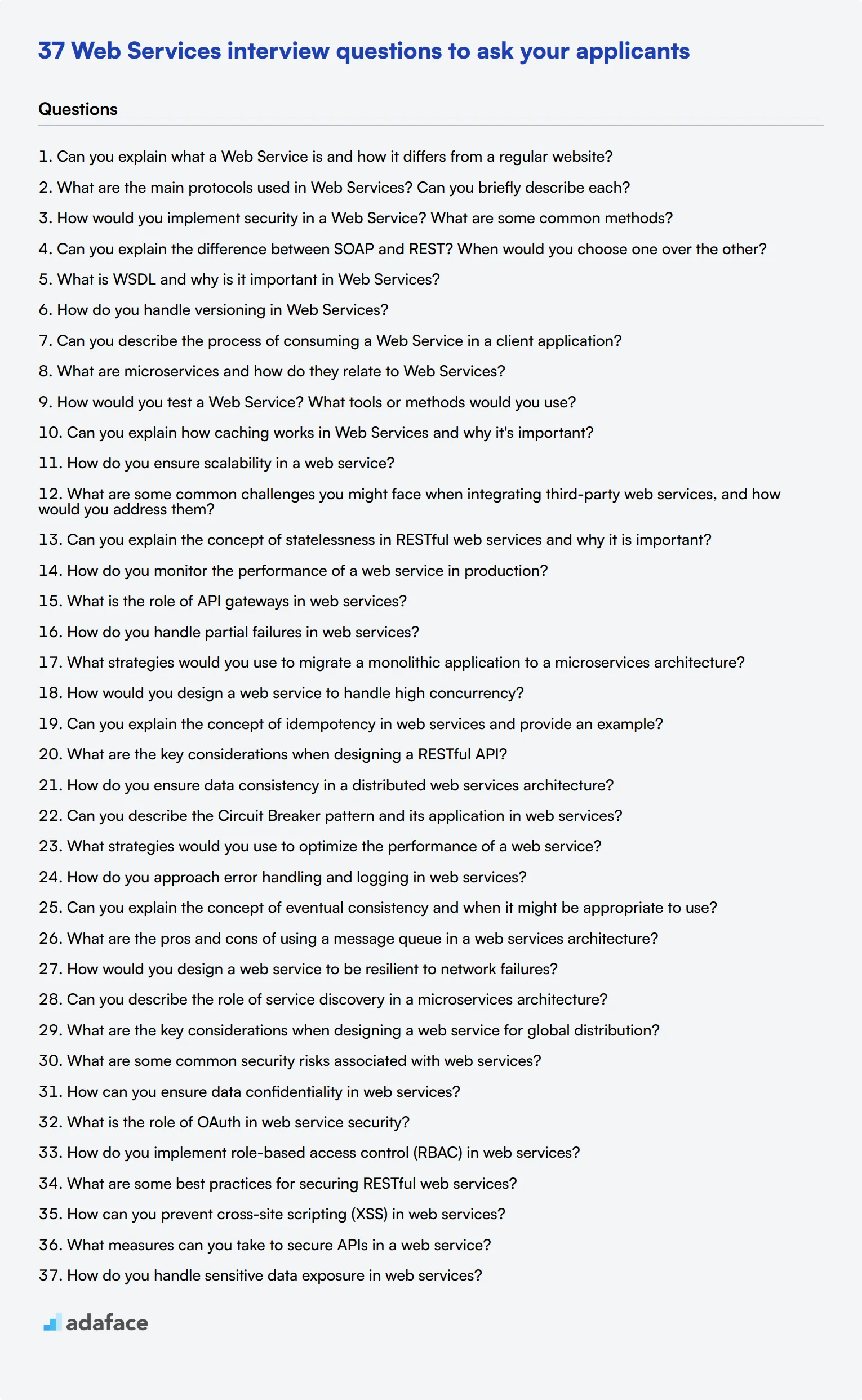Web Services have become an integral part of modern software development, and understanding how to evaluate candidates for these roles is crucial for a successful hire. Asking the right questions during an interview can help distinguish between applicants who have a solid foundation in Web Services and those who don't.
In this blog post, we outline a comprehensive list of Web Services interview questions tailored for different levels and topics. This includes evaluating junior developers, understanding architectural principles, and assessing security protocols in Web Services.
By effectively using these questions, you can ensure that you're making informed hiring decisions and building a competent team. For further assessment, consider using our REST API test to prequalify candidates before the interview stage.
Table of contents
10 common Web Services interview questions to ask your applicants
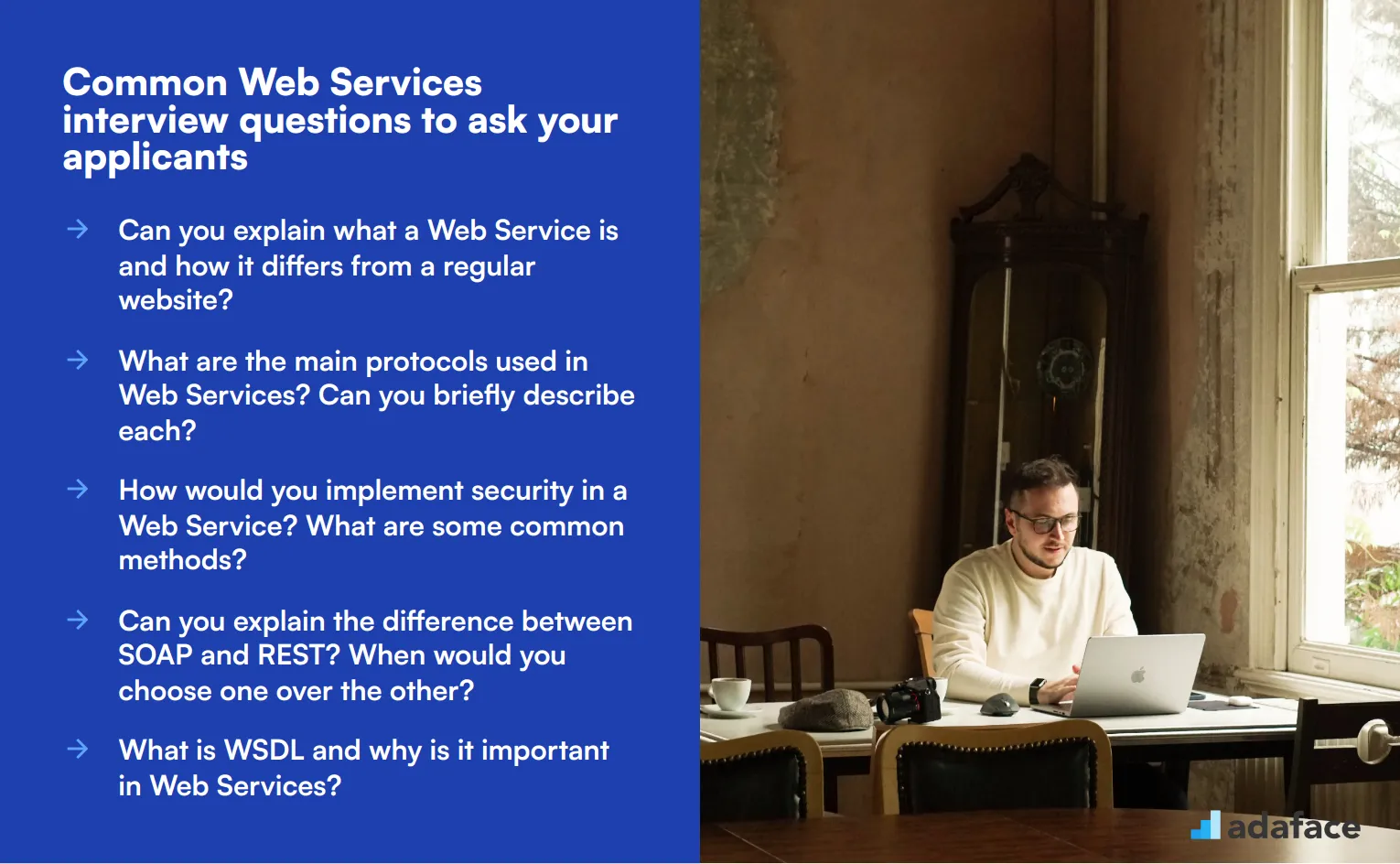
To assess whether your applicants have the necessary understanding of Web Services for your full stack developer position, consider asking some of these common interview questions. These questions cover a range of topics from basic concepts to more advanced implementations, helping you gauge the candidate's expertise level.
- Can you explain what a Web Service is and how it differs from a regular website?
- What are the main protocols used in Web Services? Can you briefly describe each?
- How would you implement security in a Web Service? What are some common methods?
- Can you explain the difference between SOAP and REST? When would you choose one over the other?
- What is WSDL and why is it important in Web Services?
- How do you handle versioning in Web Services?
- Can you describe the process of consuming a Web Service in a client application?
- What are microservices and how do they relate to Web Services?
- How would you test a Web Service? What tools or methods would you use?
- Can you explain how caching works in Web Services and why it's important?
7 Web Services interview questions and answers to evaluate junior developers
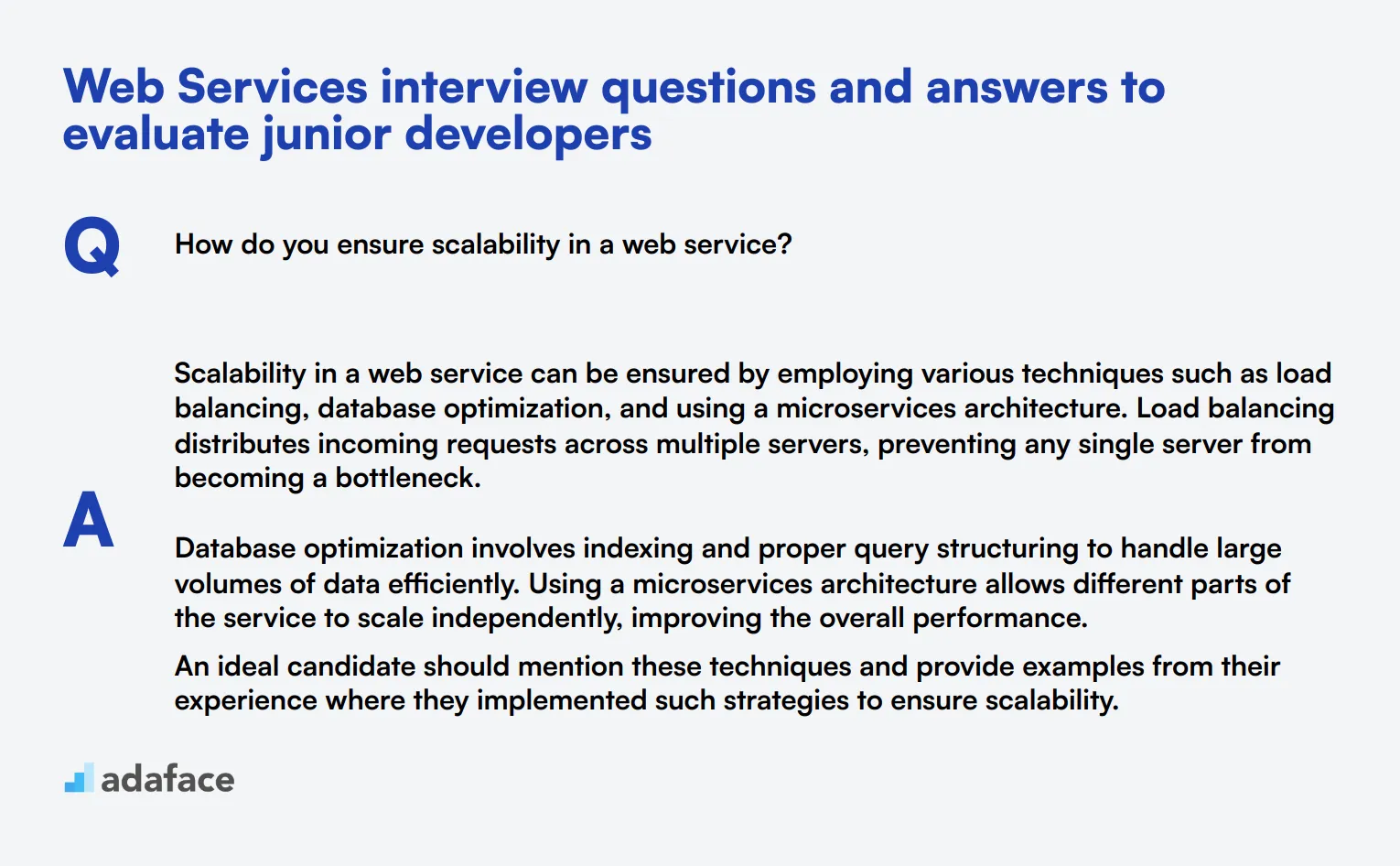
To effectively assess the core competencies of junior developers in Web Services, use the following curated interview questions. These questions are designed to provide insights into the candidate's understanding and practical knowledge of web services, ensuring you hire the best fit for your team.
1. How do you ensure scalability in a web service?
Scalability in a web service can be ensured by employing various techniques such as load balancing, database optimization, and using a microservices architecture. Load balancing distributes incoming requests across multiple servers, preventing any single server from becoming a bottleneck.
Database optimization involves indexing and proper query structuring to handle large volumes of data efficiently. Using a microservices architecture allows different parts of the service to scale independently, improving the overall performance.
An ideal candidate should mention these techniques and provide examples from their experience where they implemented such strategies to ensure scalability.
2. What are some common challenges you might face when integrating third-party web services, and how would you address them?
Common challenges when integrating third-party web services include compatibility issues, rate limiting, and handling errors gracefully. Compatibility issues might arise due to differences in data formats or protocols used by the third-party service.
Rate limiting can restrict the number of requests you can make to the service within a certain timeframe, requiring efficient request management. Handling errors gracefully involves implementing retry mechanisms and providing meaningful error messages to users.
Look for candidates who can identify these challenges and have a clear strategy for addressing them. They should also highlight any tools or techniques they've used in the past to overcome these issues.
3. Can you explain the concept of statelessness in RESTful web services and why it is important?
Statelessness in RESTful web services means that each request from a client to the server must contain all the information needed to understand and process the request. The server does not store any client context between requests.
This is important because it allows each request to be treated independently, which simplifies server design and improves scalability. No session information is stored on the server, making it easier to balance loads and recover from failures.
Candidates should demonstrate an understanding of the benefits of statelessness and be able to discuss scenarios where maintaining state might still be necessary.
4. How do you monitor the performance of a web service in production?
Monitoring the performance of a web service in production involves using tools and services to track metrics such as response time, error rates, and throughput. Common tools include New Relic, Grafana, and AWS CloudWatch.
These tools provide real-time insights and historical data, enabling you to identify performance bottlenecks and trends. Setting up alerts for specific thresholds ensures that you are notified of any issues promptly.
An ideal candidate should be familiar with these tools and able to explain how they use them to monitor and improve web service performance.
5. What is the role of API gateways in web services?
API gateways act as an entry point for all client requests to a web service. They provide various functionalities such as request routing, composition, and protocol translation. API gateways can also handle cross-cutting concerns like authentication, rate limiting, and logging.
By centralizing these functionalities, API gateways simplify the implementation and management of web services, improve security, and enhance scalability.
Look for candidates who can discuss the benefits of using API gateways and provide examples of how they have implemented or managed API gateways in their previous projects.
6. How do you handle partial failures in web services?
Partial failures in web services occur when one component fails while others continue to function. Handling these requires implementing resilience patterns like retries, circuit breakers, and graceful degradation.
Retries involve re-attempting the failed operation after a brief delay. Circuit breakers prevent the system from being overwhelmed by disabling the faulty component after a certain number of failures. Graceful degradation ensures that the service continues to operate, albeit with reduced functionality.
Candidates should describe these patterns and provide examples from their experience where they effectively handled partial failures.
7. What strategies would you use to migrate a monolithic application to a microservices architecture?
Migrating a monolithic application to a microservices architecture involves breaking down the application into smaller, independent services. This process can be done incrementally by identifying and isolating functionalities that can be converted into microservices.
Strategies include using domain-driven design to identify service boundaries, implementing API gateways for inter-service communication, and employing containerization tools like Docker for deployment.
An ideal candidate should discuss these strategies in detail and provide examples of successful migration projects they have worked on. They should also mention any challenges faced and how they overcame them.
12 Web Services questions related to architectural principles
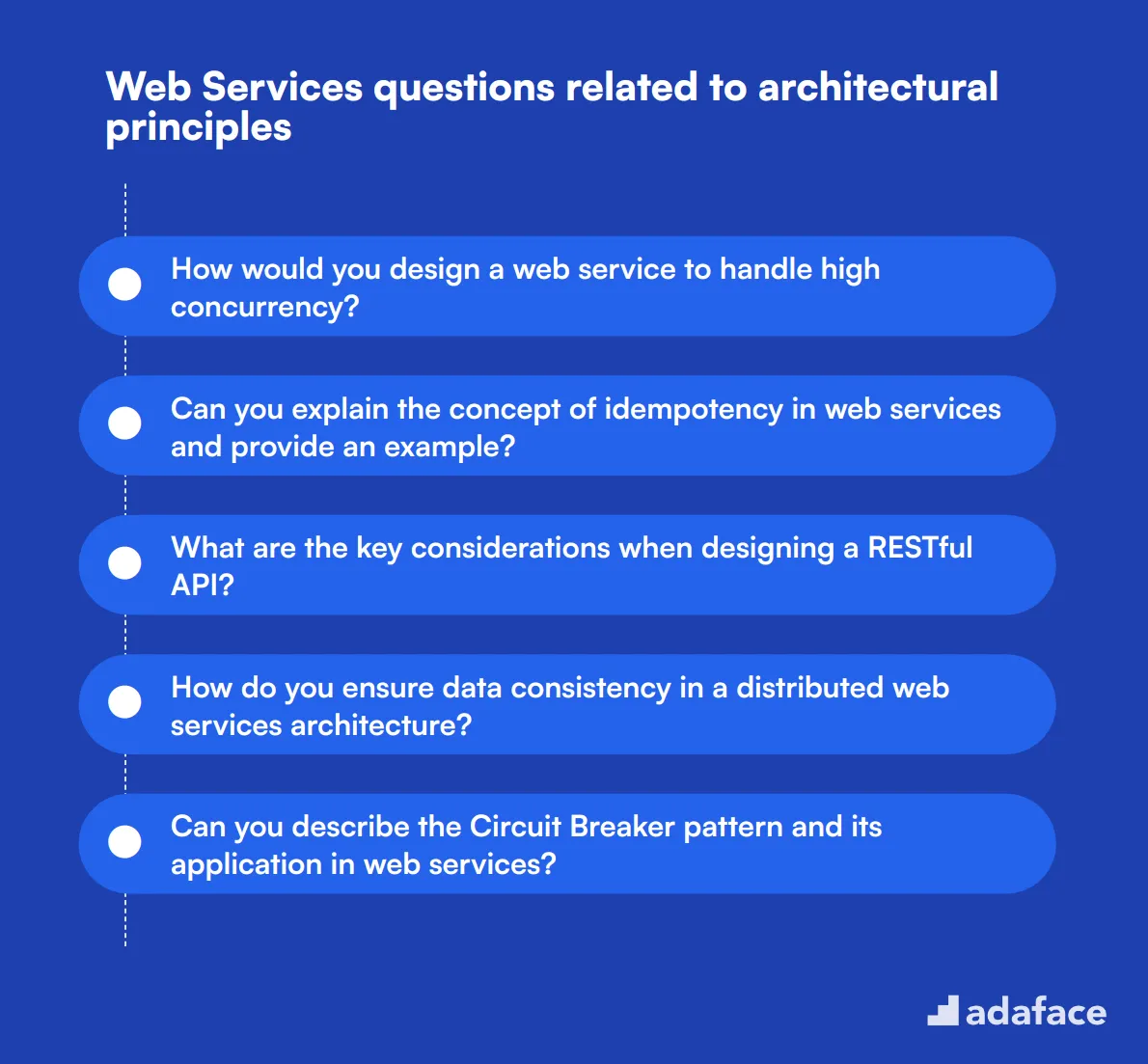
To assess candidates' understanding of web services architectural principles, use these 12 interview questions. They will help you evaluate a candidate's grasp of key concepts and their ability to apply them in real-world scenarios.
- How would you design a web service to handle high concurrency?
- Can you explain the concept of idempotency in web services and provide an example?
- What are the key considerations when designing a RESTful API?
- How do you ensure data consistency in a distributed web services architecture?
- Can you describe the Circuit Breaker pattern and its application in web services?
- What strategies would you use to optimize the performance of a web service?
- How do you approach error handling and logging in web services?
- Can you explain the concept of eventual consistency and when it might be appropriate to use?
- What are the pros and cons of using a message queue in a web services architecture?
- How would you design a web service to be resilient to network failures?
- Can you describe the role of service discovery in a microservices architecture?
- What are the key considerations when designing a web service for global distribution?
8 Web Services interview questions and answers related to security protocols
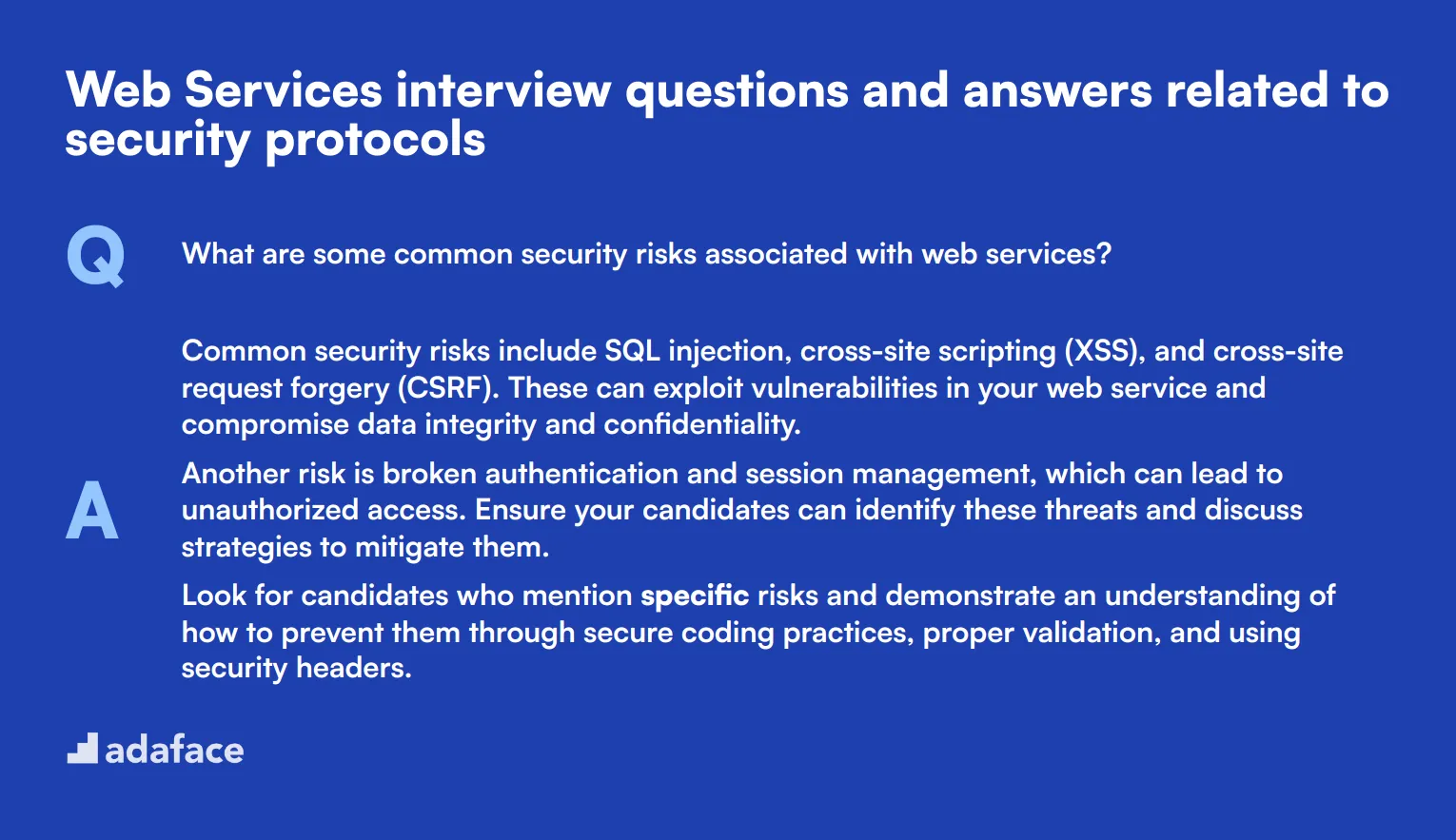
When you're looking to ensure that your web services are secure, asking the right questions during an interview is key. These questions are designed to help you determine if your candidates have the necessary knowledge of security protocols to protect your systems and data.
1. What are some common security risks associated with web services?
Common security risks include SQL injection, cross-site scripting (XSS), and cross-site request forgery (CSRF). These can exploit vulnerabilities in your web service and compromise data integrity and confidentiality.
Another risk is broken authentication and session management, which can lead to unauthorized access. Ensure your candidates can identify these threats and discuss strategies to mitigate them.
Look for candidates who mention specific risks and demonstrate an understanding of how to prevent them through secure coding practices, proper validation, and using security headers.
2. How can you ensure data confidentiality in web services?
Data confidentiality can be ensured through encryption, both in transit and at rest. Using protocols like HTTPS ensures that data transmitted between the client and the server is encrypted.
Another method is to use tokens for authentication and authorization, ensuring that only authorized users can access certain resources.
Ideal candidates will mention the use of strong encryption methods and show an understanding of the importance of securing both data in transit and at rest.
3. What is the role of OAuth in web service security?
OAuth is a protocol that allows secure authorization from web, mobile, and desktop applications. It provides a way for users to grant access to their resources without sharing their credentials.
OAuth tokens can be used to access various resources while keeping user credentials secure. It's widely used in scenarios where a third-party application needs to access user data.
Look for candidates who can explain how OAuth works and give examples of its implementation. They should demonstrate an understanding of the security benefits OAuth provides.
4. How do you implement role-based access control (RBAC) in web services?
Role-based access control (RBAC) is implemented by assigning permissions to specific roles rather than to individual users. Each user is then assigned one or more roles, which determine their access level.
This can be done by defining roles and permissions in your system and ensuring that your application checks the user's roles before granting access to resources.
Candidates should discuss the importance of defining clear roles and permissions and ensuring that these are enforced consistently throughout the application.
5. What are some best practices for securing RESTful web services?
Best practices include using HTTPS to encrypt data in transit, validating input to prevent injection attacks, and implementing proper authentication and authorization mechanisms.
Other practices include rate limiting to prevent denial-of-service attacks and using JSON Web Tokens (JWT) for secure authentication.
Ideal candidates will mention these practices and explain how they can be implemented effectively. They should also demonstrate an understanding of the importance of ongoing security assessments and updates.
6. How can you prevent cross-site scripting (XSS) in web services?
To prevent XSS, you should validate and sanitize all user inputs, ensuring that any data rendered on the web page is safe and free from malicious scripts.
Using security headers like Content Security Policy (CSP) can also help mitigate the risk of XSS by controlling the sources from which content can be loaded.
Candidates should demonstrate an understanding of input validation and sanitization techniques and the importance of security headers in preventing XSS attacks.
7. What measures can you take to secure APIs in a web service?
Securing APIs can be achieved by using strong authentication and authorization mechanisms, such as OAuth or API keys. Ensuring that only authorized clients can access your APIs is critical.
Other measures include rate limiting to prevent abuse, input validation to avoid injection attacks, and logging and monitoring to detect and respond to suspicious activities.
Look for candidates who can discuss these measures in detail and provide examples of how they can be implemented to secure APIs effectively.
8. How do you handle sensitive data exposure in web services?
Sensitive data exposure can be handled by encrypting sensitive data both in transit and at rest. Ensuring that sensitive data is not logged or stored in plain text is also important.
Another approach is to use tokenization or data masking to obscure sensitive data, making it less useful if intercepted.
Candidates should show an understanding of the importance of protecting sensitive data and discuss various techniques to ensure its confidentiality and integrity.
Which Web Services skills should you evaluate during the interview phase?
While it's impossible to fully assess a candidate's capabilities in a single interview, focusing on key Web Services skills can provide valuable insights. Identifying these core skills helps in evaluating how well a candidate is prepared to handle real-world tasks and their potential for growth within your organization.
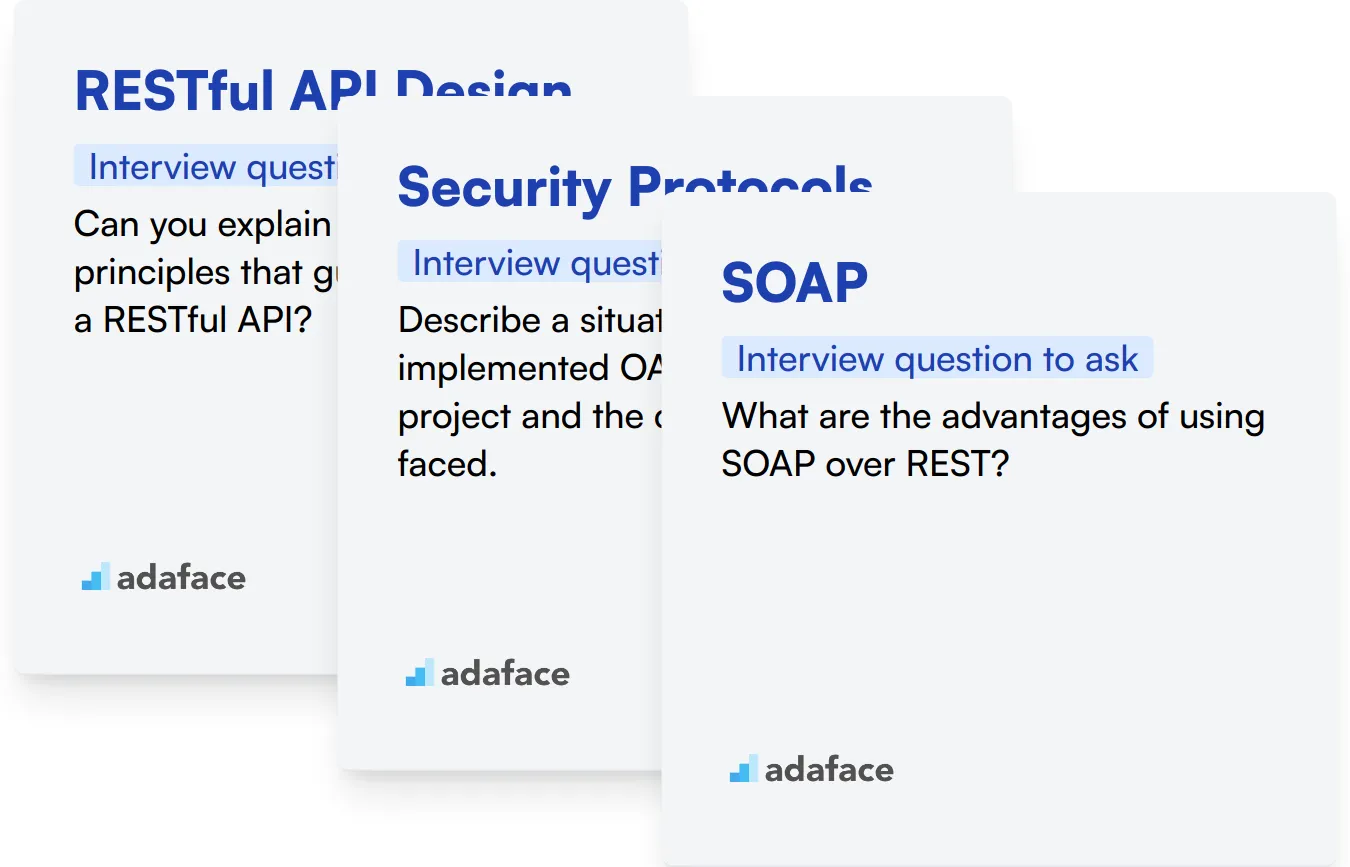
RESTful API Design
The design of RESTful APIs is central to modern web services, facilitating clear and effective communication between different software components. Mastery in this area ensures that a developer can effectively create scalable and maintainable services.
Consider using an assessment test with relevant multiple-choice questions (MCQs) to evaluate this skill. Our REST backend-engineer assessment test offers a good starting point.
To delve deeper, you may want to pose specific interview questions about API design.
Can you explain the main principles that guide the design of a RESTful API?
Listen for understanding of statelessness, resource identification, and the correct use of HTTP methods. The candidate's ability to articulate these principles reflects their depth of knowledge.
Security Protocols
Security is paramount in web services to protect data integrity and prevent unauthorized access. Evaluating a candidate's knowledge of security protocols ensures they can build safe systems.
Candidates’ understanding of security can be assessed with questions about common protocols and best practices. Our cyber-security test provides a comprehensive set of MCQs to help gauge this skill.
Additionally, specific interview questions can evaluate their practical application of security protocols.
Describe a situation where you implemented OAuth2.0 in a project and the challenges you faced.
This response reveals not only theoretical knowledge but also practical experience and problem-solving capabilities in implementing secure authentication.
SOAP
Understanding SOAP (Simple Object Access Protocol) is essential as it remains a popular protocol for web services requiring high security and transaction compliance. Knowledge of SOAP indicates a developer’s ability to work with a range of web service designs.
For an initial screening focused on SOAP skills, our SOAPUI online test could be a useful tool.
In the interview, probing further into SOAP can provide insights into the candidate’s expertise.
What are the advantages of using SOAP over REST?
Look for candidates to discuss SOAP’s standardized protocol, built-in error handling, and extensibility which are beneficial for certain types of applications.
Use Web Services Interview Questions and Skills Tests to Hire Top Talent
When hiring for Web Services expertise, it's important to verify that candidates truly possess the skills they claim. A reliable assessment can make all the difference.
The best way to assess candidates' abilities is through targeted skills tests. Consider using Adaface assessments such as the REST API Test or the XML Online Test to gauge their technical proficiency before moving forward.
After candidates complete these tests, you can confidently shortlist the top performers for interviews. This approach ensures only the most capable applicants proceed in the hiring process.
To get started, sign up on our dashboard to access all the necessary tools for a streamlined hiring process. For more information on the various assessments we offer, visit our test library.
XML Web Services & XML Online Test
Download Web Services interview questions template in multiple formats
Web Services Interview Questions FAQs
The questions cover common Web Services concepts, junior developer skills, architectural principles, and security protocols.
There are 7 Web Services interview questions specifically tailored for evaluating junior developers.
Yes, the list includes 8 questions focused on Web Services security protocols.
These questions can help assess candidates' knowledge and skills in Web Services, allowing you to make informed hiring decisions.
Yes, the questions are diverse and can be used to evaluate candidates from junior to senior levels in Web Services roles.

40 min skill tests.
No trick questions.
Accurate shortlisting.
We make it easy for you to find the best candidates in your pipeline with a 40 min skills test.
Try for freeRelated posts
Free resources




